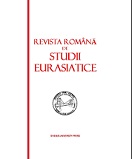LANDMARKS IN DOBRUDJA’S FORCED COLLECTIVIZATION
LANDMARKS IN DOBRUDJA’S FORCED COLLECTIVIZATION
Author(s): Marian CojocSubject(s): History
Published by: Ovidius University Press
Keywords: Romania; Dobrudja; experiments in totalitarian socialism; collectivism
Summary/Abstract: Dobrudja was the first region of the country which has seen the plight of forced collectivization, between 1949-1957. The process of nationalization was preceded, however, in the whole country (11 June 1948-2 April 1950), when between the 8894 nationalized companies, including those 3560 local interest, were found the 30 of Constanta county and 27 from the Tulcea county. It was one preceding and at the same time, the employment of training documents that are held by collectivization and liquidation of the last properties, considered in official propaganda, estates. We can judge technically about the agriculture Dobrudja, the nationalization of 68 mills, 36 oil presses and five bakeries (2 March 1949, the last two mills in the villages Horia and Gârliciu in Dobrudja were transferred into State ownership). There was therefore a clear link between the two policy measures promoted by RWP as its press organ in Dobrudja, „New Dobrudja”, headlined in June 19, 1948: „The nationalization of enterprises, is to the flourishing farms”, because „Factory workers will make efforts to persuade to the mechanization of agriculture, to raise agricultural productivity for the benefit of yoke workers”. The relationship between the two „historical processes” (nationalization, from 1948 to 1950 and co-operativization, 1949-1962) nationally and especially in Dobrudja can be evaluated by its final result: deprivation in important social categories of their assets and the shift of their assets to socialist state. Agriculturaly, Dobrudja, as well as the entire Romanian society, was at that time part of rigorously planned socio-economic experiment called socialism. In this „experiment” Dobrudja has, unfortunately, an „absolute and unwanted record as the first region completely collectivized”.
Journal: Revista Română de Studii Eurasiatice
- Issue Year: 6/2010
- Issue No: 1+2
- Page Range: 133-144
- Page Count: 12
- Language: English

